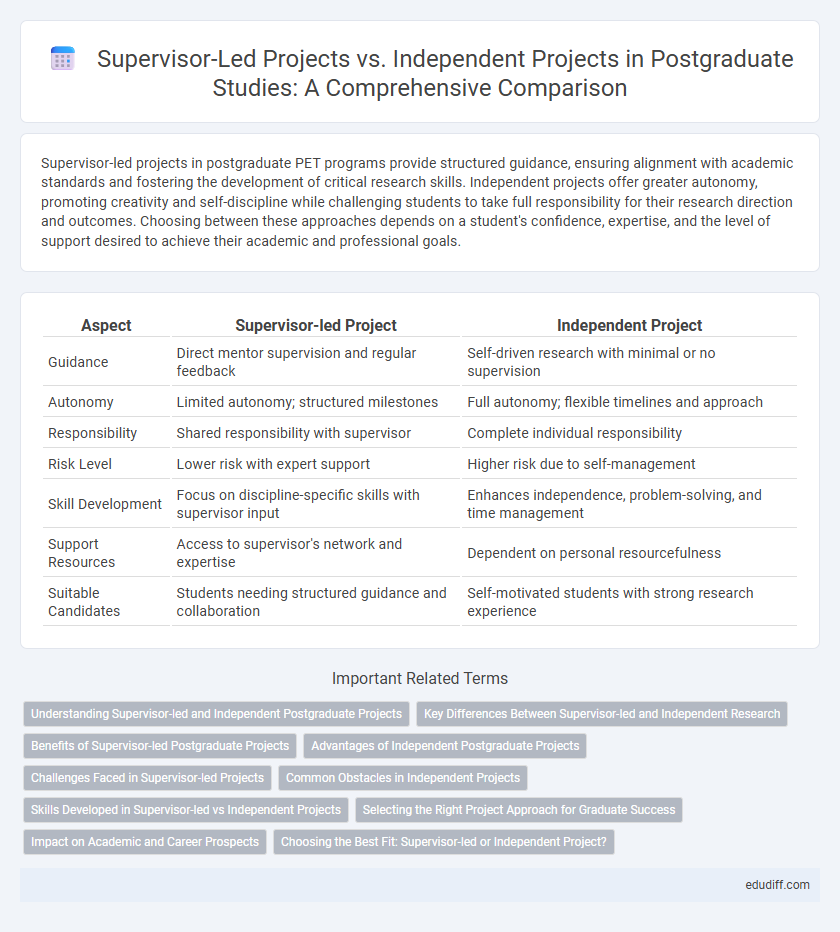Supervisor-led projects in postgraduate PET programs provide structured guidance, ensuring alignment with academic standards and fostering the development of critical research skills. Independent projects offer greater autonomy, promoting creativity and self-discipline while challenging students to take full responsibility for their research direction and outcomes. Choosing between these approaches depends on a student's confidence, expertise, and the level of support desired to achieve their academic and professional goals.
Table of Comparison
| Aspect | Supervisor-led Project | Independent Project |
|---|---|---|
| Guidance | Direct mentor supervision and regular feedback | Self-driven research with minimal or no supervision |
| Autonomy | Limited autonomy; structured milestones | Full autonomy; flexible timelines and approach |
| Responsibility | Shared responsibility with supervisor | Complete individual responsibility |
| Risk Level | Lower risk with expert support | Higher risk due to self-management |
| Skill Development | Focus on discipline-specific skills with supervisor input | Enhances independence, problem-solving, and time management |
| Support Resources | Access to supervisor's network and expertise | Dependent on personal resourcefulness |
| Suitable Candidates | Students needing structured guidance and collaboration | Self-motivated students with strong research experience |
Understanding Supervisor-led and Independent Postgraduate Projects
Supervisor-led postgraduate projects provide structured guidance and expert feedback, enhancing research quality through regular mentorship and defined milestones. Independent projects offer greater autonomy, encouraging development of self-motivation, problem-solving skills, and innovative thinking without constant oversight. Both approaches require critical thinking and time management, but supervisor-led projects often result in more focused outcomes due to continuous academic support.
Key Differences Between Supervisor-led and Independent Research
Supervisor-led projects provide structured guidance, clear objectives, and regular feedback, ensuring academic rigor and alignment with institutional standards. Independent projects offer greater autonomy, allowing researchers to explore unique questions, develop self-discipline, and build problem-solving skills without constant oversight. The key differences lie in the level of mentorship, control over research direction, and responsibility for project management.
Benefits of Supervisor-led Postgraduate Projects
Supervisor-led postgraduate projects offer structured guidance that enhances research quality and ensures adherence to academic standards. Access to expert feedback and ongoing mentorship helps students navigate complex methodologies and data analysis effectively. This collaborative approach increases the likelihood of producing publishable results and strengthens professional development opportunities within the academic community.
Advantages of Independent Postgraduate Projects
Independent postgraduate projects foster critical thinking and self-discipline, enabling students to manage their own research agenda and timelines. This autonomy enhances problem-solving skills and encourages original contributions to the field, often leading to higher innovation and creativity. Furthermore, independent projects provide valuable experience in project management and decision-making, which are essential for professional development and future academic or industry roles.
Challenges Faced in Supervisor-led Projects
Supervisor-led projects often face challenges such as limited autonomy, which can restrict creativity and delay decision-making. Misalignment between the supervisor's expectations and the student's research goals may lead to conflicts and reduced motivation. Communication barriers and inconsistent feedback exacerbate difficulties, affecting project progress and quality.
Common Obstacles in Independent Projects
Common obstacles in independent postgraduate projects include limited access to expert guidance, which can hinder critical decision-making and problem-solving. Students often face challenges in maintaining motivation and time management without regular supervision, leading to potential delays or subpar outcomes. Furthermore, resource constraints and difficulties in navigating administrative requirements may affect the quality and scope of independent research.
Skills Developed in Supervisor-led vs Independent Projects
Supervisor-led projects enhance skills in structured research methodologies, effective communication with mentors, and teamwork, fostering collaborative problem-solving abilities essential in academic and professional settings. Independent projects develop critical thinking, self-motivation, and time management skills, encouraging autonomy and innovative approaches to complex problems without direct oversight. Both project types cultivate analytical skills and adaptability, but supervisor-led projects emphasize guided learning, while independent projects prioritize initiative and decision-making.
Selecting the Right Project Approach for Graduate Success
Choosing between a supervisor-led project and an independent project significantly impacts postgraduate success, as supervisor-led projects offer structured guidance and access to established research networks, enhancing project quality and timely completion. Independent projects foster autonomy, critical thinking, and innovative problem-solving skills, essential for doctoral research and academic publishing. Assessing one's research experience, time management ability, and career goals ensures selection of the project approach that aligns with academic objectives and professional development.
Impact on Academic and Career Prospects
Supervisor-led projects often provide structured guidance, increasing the likelihood of producing publishable research that enhances academic credentials and strengthens career opportunities in academia or industry. Independent projects foster critical thinking, self-motivation, and problem-solving skills, traits highly valued by employers and beneficial for entrepreneurial or research-intensive career paths. Both project types significantly impact skill development; supervisor-led projects emphasize collaborative learning and networking, while independent projects highlight initiative and resilience, shaping diverse future academic and professional trajectories.
Choosing the Best Fit: Supervisor-led or Independent Project?
Choosing the best fit between a supervisor-led project and an independent project depends on your research experience, available guidance, and learning style. Supervisor-led projects offer structured support, expertise, and clearer timelines, ideal for those seeking mentorship and collaborative feedback. Independent projects demand strong self-motivation and project management skills, suited for students aiming to explore unique ideas with full autonomy.
Supervisor-led Project vs Independent Project Infographic

 edudiff.com
edudiff.com